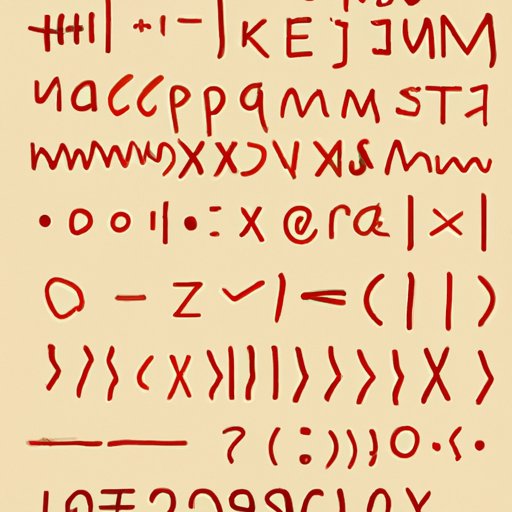Introduction
Letters are symbols that represent sounds, words, or ideas. They are the foundation of all written language and form the basis for how humans communicate with each other. But who invented letters? This article seeks to answer this question by exploring the historical development of written language and the impact of letter invention on human communication.
Historical Overview of the Invention of Letters
The invention of letters is a complex process that spans thousands of years. According to research, the earliest forms of written language appeared around 8,000 BC. These ancient pictographs were used to record everyday events and were made up of simple lines and shapes. Over time, these pictographs evolved into more abstract symbols, which eventually became the basis for modern writing systems.
The first alphabetical writing system is believed to have been developed by the Phoenicians around 1,600 BC. This system was based on the sounds of spoken language and consisted of 22 symbols, each representing a consonant. The Phoenician alphabet spread throughout the Mediterranean region and eventually gave rise to the Greek alphabet. The Greek alphabet, in turn, served as the basis for the Latin alphabet, which is the most widely used writing system today.

Impact of Letter Invention on Human Communication
The invention of letters had a profound impact on human communication. Before the invention of letters, people relied on oral storytelling and memory to pass down knowledge and information. But with the advent of written language, knowledge and information could be recorded, shared, and preserved for future generations.
The development of written language also allowed for the spread of ideas across vast distances. Ancient scribes played a crucial role in this process, traveling across the world to spread their knowledge and teach others how to read and write. By doing so, they enabled the growth of trade and commerce, as well as the exchange of religious and philosophical ideas.
The invention of letters also had a major impact on politics. For example, the emergence of written constitutions allowed governments to codify laws and establish systems of governance. Furthermore, the widespread use of written language enabled citizens to participate in their government by having access to legal documents, such as contracts and treaties.
Conclusion
In conclusion, the invention of letters has had a profound impact on human communication and civilization. From ancient pictographs to modern writing systems, letter inventors have changed the way we communicate and interact with each other. They have enabled us to share knowledge, ideas, and information across vast distances, which has had a major impact on our political, economic, and social systems.
The importance of letter invention cannot be overstated. It is a testament to the power of human ingenuity and creativity, and it serves as a reminder of how far we have come as a species.
(Note: Is this article not meeting your expectations? Do you have knowledge or insights to share? Unlock new opportunities and expand your reach by joining our authors team. Click Registration to join us and share your expertise with our readers.)
